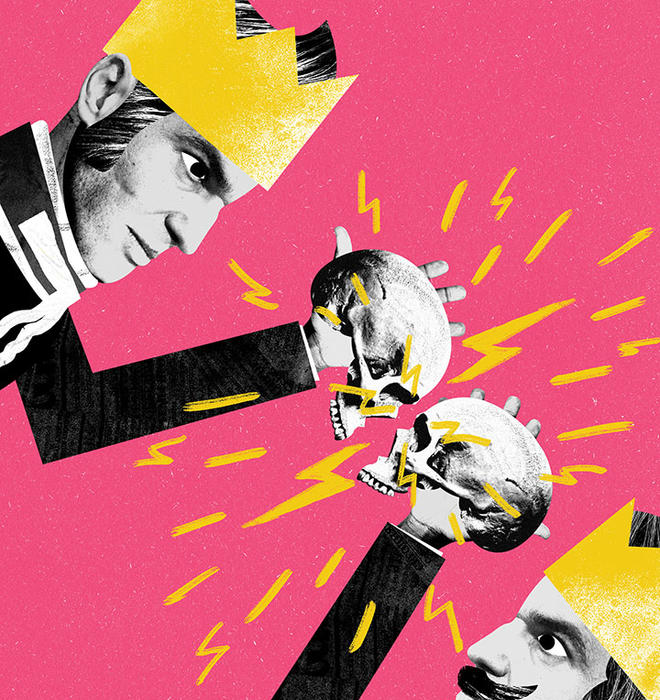
ONE OF THE DEADLIEST RIOTS in New York City’s history was caused, perhaps foreseeably, by Shakespeare. In the decades following their break from the motherland, Americans made a national project of stockpiling language sufficiently lofty to match their dreams of a great civilization. They festooned the landscape with grand names from the Bible or classical antiquity: Babylon, Jerusalem, Mount Sinai, Troy, Ithaca, Syracuse, Rome. And, since Shakespeare was universally honored as the greatest author in the English language, they set themselves to the task of making Shakespeare an American. The historian Lawrence Levine writes that Shakespeare was by far “the most popular playwright of the colonies,” his works mandated at every level of schooling and kept in homes as a staple alongside the Bible.
In the 1830s, Alexis de Tocqueville remarked of the young country, “There is hardly a pioneer’s hut that does not contain a few volumes of Shakespeare. I remember that I read the feudal drama of Henry IV for the first time in a log cabin.” A few decades later, Mark Twain apprenticed for a riverboat pilot who, he later recalled, would pass the time by reciting passages of the Bard. (In his novel Huckleberry Finn, a pair of traveling hustlers makes money by visiting towns along the Mississippi River and staging scenes from Shakespeare’s plays. The gimmick assumes that frontier towns hold ready audiences for Shakespeare.) “Shakespeare belongs to two nations now,” declared Willa Cather in 1894: the nation that reared him and the nation that he helped to rear. “Then,” she wrote, “one always fancies if he had been born just a few centuries later he would have been an American.”
In New York City, already a center of immigration in the mid-19th century, Bardolatry was aligned with the desire, on the part of city fathers and immigrants alike, for the newcomers to be Americanized. School curricula drilled down on Shakespeare to join the students in a common literature; immigrant-aid societies hosted performances of Shakespeare and lectures on his plays. (“A good percentage of the audiences have not long been masters of the English Language,” one society boasted of these shows. “What a grand and inspiring entrance was here provided for them — the best English Literature ever cast in dramatic form.”) Meanwhile, immigrants seized upon Shakespeare as an elevating figure. Inhabitants of the city’s tenements decorated their homes with postcards and calendars featuring Shakespeare’s characters, which they cut from the newspaper or bought from street peddlers. Cheap theaters on the Lower East Side staged Shakespeare for enthusiastic crowds — more enthusiastic, many commentators said, than those at the tony theaters uptown.
That this compound of nationalism and Bardolatry might one day ignite was therefore understandable. With blood still running hot from the Revolution and the borders mostly settled, it was natural that the territorial dispute between England and the States would move, as the 19th century advanced, to language. Noah Webster designed his American dictionary, first published in 1828, to “rationalize” the spelling of English, thus showing America to be a superior heir to the nations’ common language. In the realm of education, meanwhile, claiming the language of Shakespeare on behalf of the American elite could seem a way to assert the young nation’s natural nobility and deter the threat of mongrelization. As late as 1886, an educator could propose that Shakespeare’s language would purify immigrant students in the classroom: “Nothing would so withstand the rush into our language of vapid, foreign dilutions as a baptism into Shakespeare’s terse, crisp, sinewy Saxon.” (This is, of course, a strange description of Shakespeare’s English, which is the definition of a melting pot.)
In short, the claim to a poet’s “realms of gold” was, that night in New York, part of a larger field of regional animosities and territorial conflict. Historically speaking, theories about literature have killed a surprising number of people, but here the death toll was unusually high: 25 people dead, more than 120 wounded, and very few left the wiser about Shakespeare.
The immediate cause of the riot was a conflict between two actors, one American and one English. The first combatant was Edwin Forrest, a son of Philadelphia who billed himself as “The Native Tragedian.” He preferred roles, as the historians Roberta Pearson and William Uricchio note, that enabled him to play purple as a tragic rebel and then die a magnificent death. In a rhetorical turn that was then commonplace, he associated his American artistry with the grandeur of the American landscape: His voice was as “the falls of Niagara,” his thighs “carved out of the American forest.” The second combatant was William Charles Macready, a Londoner who held a towering reputation as a Shakespearean. His style was pensive, ostentatiously intellectual; he told his diary that he did not believe Forrest understood Shakespeare’s language.
Today, the rivalry would play out on Twitter. In the 1840s, the medium of combat was the popular press, which construed it as a diplomatic struggle. In 1845, Forrest told the American papers that Macready had used his connections in London’s media elite to arrange for bad reviews of Forrest’s London tour. (The reviews exemplified, he said, “that narrow, exclusive, prejudiced, and may I add, anti-American feeling which prescribes geographical limits to the growth of genius and talent.”) In 1846, Forrest attended a show in which Macready played Hamlet, where, in a gesture that set the British press howling, Forrest hissed. In 1848, the two actors set out on simultaneous national tours in the United States, where — in an act of supreme mutual churlishness — they scheduled several stops on the same nights in the same municipalities.
On May 7, 1849, they were in New York City: Macready played Macbeth at the Astor Place Opera House, while Forrest played the same role at the Broadway Theatre. This being New York, real estate signified: Broadway meant popular theater, while the Opera House stood out as a symbol of conspicuous wealth. Forrest supporters filled the city’s lower classes; they included, curiously, both Irish immigrants angry with the English for the potato famine and “American nativists” angry with the English for sending Irish immigrants their way. That night, they bought up blocks of tickets to Macready’s Astor Place performance, where they threw rotten eggs, pennies, and chairs. The play had to stop early due to the disruption.
Macready tried to leave town, but a committee of distinguished New Yorkers, including Washington Irving, wrote formally to ask him to finish his run. He assented, and word went out that he would reappear as Macbeth May 10. According to a pamphlet that appeared the same year, this exchange only deepened the anger of Forrest supporters: “The question became not only a national, but a social one. It was the rich against the poor — the aristocracy against the people.”
On the appointed night, Macready strode out before a packed house as Macbeth. (Forrest was again at the Broadway Theatre, but — ominously, in retrospect — half of the seats were empty.) The police were present at Macready’s performance, and the play made it to the closing curtain undisturbed, with the exception of some hecklers whom the police escorted out partway through. However, the riot was already fomenting. Before Astor Place opened its doors, the surrounding streets had begun to fill with a muttering, aimless crowd. Soon the streets held 15,000 people. Eventually — perhaps when the police hauled the hecklers outside — the crowd surged into action, shoving at the doors of the Opera House and throwing paving stones at the windows. The theater’s employees put up makeshift barricades; the police found themselves overwhelmed, and the National Guard arrived with bayonets to subdue the crowd and escort Macready’s audience to safety. Finally, unable to use bayonets effectively against the enormous mob, the officers took out rifles and opened fire.
The following morning, the light rose on a soberer city. The troops had managed to clear the streets, although cannons now stood outside Astor Place as a warning. Macready had escaped by disguising himself as one of the rioters and — in the most dangerous role of his career — sneaking away in the crowd. It was left to the newspapers, which had done so much to stir up the public, to make sense of the aftermath. (One paper tutted on May 12: “For the last 36 hours, New York has worn the aspect of a civil war, all because two actors had quarreled!”) In time, the event passed into theatrical history, there to be interpreted waggishly as the worst critical review of all time. The Shakespearean Michael Dobson hears echoes of the riot in a music-hall song that debuted in 1922:
I acted so tragic the house rose like magic,
The audience yelled, “You’re sublime!”
They made me a present of Mornington Crescent,
They threw it a brick at a time.
Someone threw a fender, which caught me a bender,
I hoisted a white flag and tried to surrender.
They jeered me; they queered me,
And half of them stoned me to death;
They threw nuts and sultanas, fried eggs and bananas,
The night I appeared as Macbeth.







No responses yet